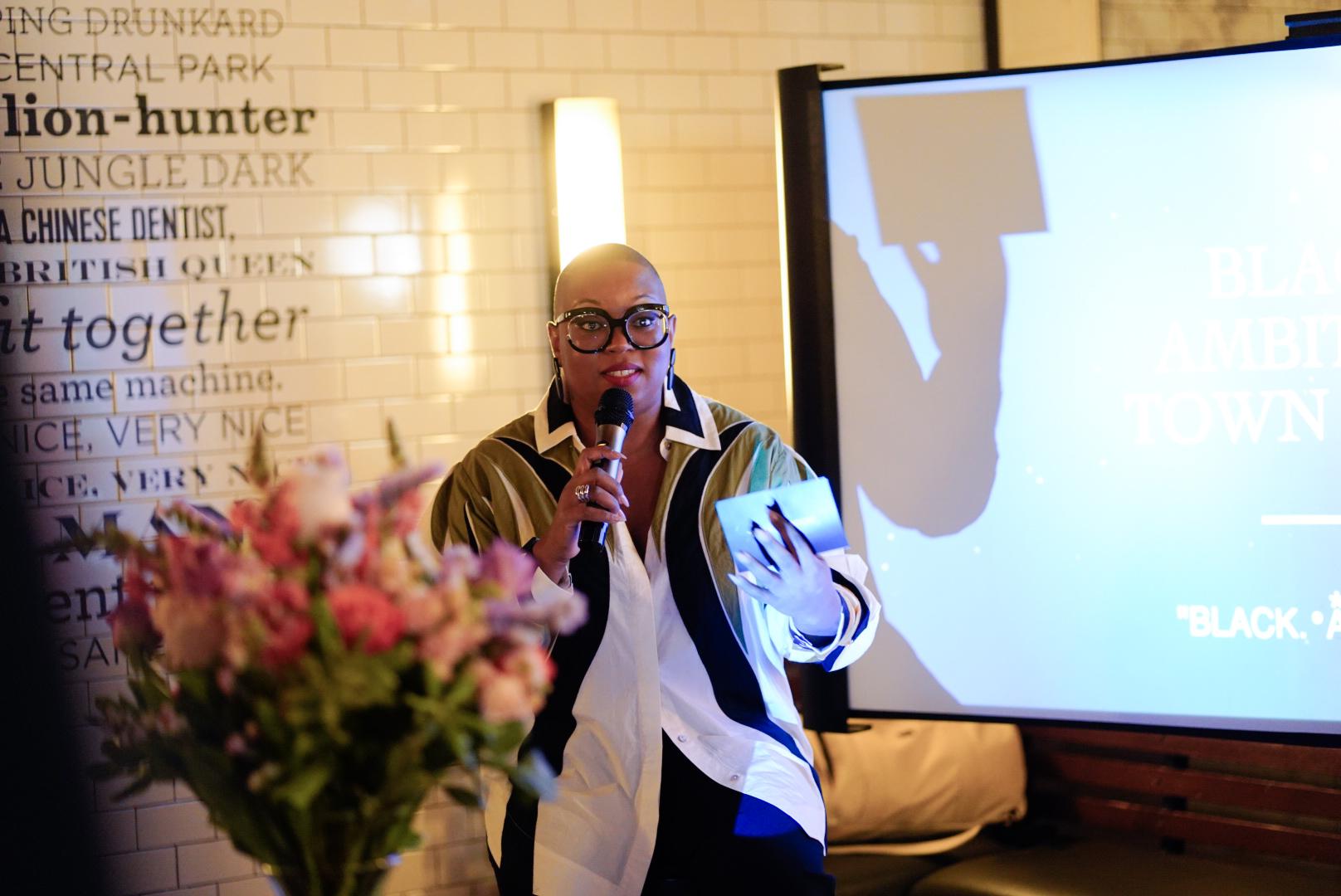Adventures Fighting Workplace Sexism

Welcome to The F Word, where we, Lauren Lang and Julia Sonenshein, discuss issues that impact all of us—both in and out of the workplace. We know that for us, coming to understand the f-word (in this case, feminism), and how important it is in the scope of our lives, didn’t happen overnight. We hope you’ll join us once a month as we meet to discuss power, workplace politics, and how exactly to respond when your male coworker asks you to take notes at that staff meeting. Again.
Lauren: Hey, Julia! I’m so excited to be kicking off this series with you. Let’s chat day-to-day feminism, and start where many, many women still experience sexism in 2017: the workplace. Even though we’re no longer living in Mad Men days (that simpler time when we could all smoke and drink Manhattans at the office), there are still so many ways in which women experience discrimination at work.
Today we’re here for some real talk about “soft sexism.” The term sounds a bit silly and contradictory, not unlike “light treason” or “minor surgery.” But the softness of this kind of communication isn’t so much in the method as it is in the delivery: small, subtle ways of minimizing women at work, and microaggressions (everyday cues that target marginalized people without reading as overtly bigoted—here’s a great primer) that erode our confidence and dampen our ambition at the same time. The scariest part? We can become so used to these understated insults that we fail to even notice them.
Julia, what are some ways that you’ve witnessed soft sexism at work? And how does it differ from the overt sexual harassment that national treasures Dolly Parton, Lily Tomlin, and Jane Fonda had to endure in their day?
Julia: Hi, Lauren! I had always thought I was a feminist—using the definition that, regardless of gender, all people deserve to be treated equally—but there was so much to this whole f-word gambit that I didn’t realize as a younger person. For example, there were ways in which I was actually trained to perpetuate unfair treatment of myself and others. Yikes.
But the reason sexism is still so entrenched in our society is that it works—just look at how long it took for Harvey Weinstein to face consequences for his actions.The patriarchy (the system in our society that keeps white, straight, men in positions of power) is super effective at teaching women to do its own dirty work. So, I always thought of workplace sexism as extreme examples, like a woman being paid $20K less per year than a male colleague, or something physical like a hand on a knee during a meeting. But what is referred to as “soft sexism” is perhaps more insidious: It hides in plain sight. In previous jobs, I heard, for example, casual comments about the pitch of my voice (too high to sound “serious”). They were delivered as jokes, but they weren’t jokes—they were there to undermine me.
But the “compliments” were worse: “You’re a tough negotiator, just like the guys.’” “You ended up being a real hardass, like Insert-Male-Coworker name. You could be a manager.” And here’s what still kills me: I loved those comments. Being “one of the guys” was such an accomplishment—I had finally proven my worth as an employee. I’m also very aware that my experiences pale in comparison to my coworkers who aren’t white, abled, or privileged in the many other ways that I am—it gets so much worse.
When I started working with people who didn’t define my worth by how similar I was to my male peers, but simply how effectively I could do my job (specifically, a company with mostly female leadership), I thought…What in the goddamn hell did I allow in previous positions? Why didn’t I say, “No, I’m a hardass because that’s who I am—being a hardass knows no gender”? Why did I just high five them and head back to my desk, feeling awesome, but also like something was…off? I simply didn’t know any better.
Lauren, I’d be curious to hear about your experiences—and I know that soft sexism in the workplace goes far beyond the ways in which we talk to our non-male employees talk to us. Non-male employees are often subject to a number of assumptions about what they can contribute to the team, and I’d love to hear your take.
Lauren: Oh Julia… you know what they say about assumptions.
It’s the little things, right? The assumptions that our delicate brains can’t handle the type of lucrative work our male colleagues get—or that we’re too “emotional” or not assertive enough or too bitchy. You know what we are good for, though? Grocery shopping for coffee creamer and toilet paper! Taking notes during meetings instead of giving notes! Making copies and planning the office holiday party! Barf. Those little assumptions signal a fundamental devaluation of what we bring to the table—intellectually and otherwise.
When I was in grad school I worked part-time for a small online sales company in southern California. I was the only woman in an office with 4-5 guys. The culture was laid back and fun, but there were problems. Sometimes I would commute my usual hour in bumper-to-bumper traffic to show up by 9:30 … only to find the door was locked. Why? Everyone else had gone surfing that morning and no one thought to tell me. So I’d passive-aggressively log my work hours while I listened to music in the parking lot.
Once one of the sales reps was tossing a soda bottle around, and someone said to him, “Hey, man, you’re going to make that bottle explode.” And the guy LITERALLY said, as I sat at the computer next to him, “Ha! That would make a huge mess for Lauren to clean up, wouldn’t it?” Here I am, earning an advanced degree, and some yahoo thinks I’m going to wipe up his beverage. I gave him a glare which was laughed off, and it was clear that I was expected to laugh along: Hahahaha! Yes! That would be a huge fucking mess for me to clean up! How HILAAAARIOUS!!!!
Here’s a thought about age, Julia, since you brought it up: I think there’s a lot of heinous shit in the workplace that younger women feel like they have to take because they don’t know how not to take it. 20-something Lauren was willing to do just about anything to make people happy. The very idea of disappointing an authority figure by standing up for myself was enough to make me shove my voice and my feelings into the back of my throat. I put my head down and did what needed to be done so that I could be a “team player.”
But I am older now, and I no longer feel inhibited in this way—an evolution I ascribe to parenthood, which allows me to disappoint someone on a daily basis and live to tell about it. The world still turns!
2017 Lauren Lang would go full Targaryen on that dumbass sales rep: She’d let him have it—then calmly set his printer on fire, flip it over, and storm out, gloriously naked and unscathed. But in addition to the blessing of wisdom and age, I am also privileged by being cis, white, straight, etc. Feeling empowered comes in large part from being empowered, and I want to acknowledge that many people continually struggle with workplace discrimination that makes voicing their rights much more difficult, if not impossible. (This article is a good primer on the ways in which it’s much easier for white women like us to speak up than for people of color).
Julia, in a culture in which 1 in 3 women is a victim of sexism in the workplace and 3 in 10 minority employees report experiencing discrimination just in the last 30 days, where your newsfeed is filled with statuses that say “Me too,” what are some actionable steps that companies could take to prevent this behavior? How can we look out for each other more, both as co-workers and as supervisors or managers?
Julia: I’m totally with you: Nowadays, I am able to speak up. But like you, I’m white, cis, able-bodied, and while I’m not straight, I pass for straight with minimal effort. People of color, trans or non-binary people, people with disabilities, and other marginalized people might not feel safe in the way that we do now.
And that also factors into your question about how we can work to undo this workplace culture that marginalizes anyone who isn’t a white, straight, cis man. Just one easy way to create a more inclusive culture from a managerial standpoint is to always be aware of the power dynamics in the room. Take meetings, for example. My friend B. is a cis gay man who is often asked to take notes, plan parties, or asked where they keep the toilet paper, despite being a senior employee and not an office manager. He says that it’s because of his mannerisms, which might be perceived as feminine, that over his career, he’s often grouped with the women in his office (reminder that gay men can also be victims of misogyny). He introduced me to this fantastic concept that I’ve used when I’ve led meetings where white men are talking over everyone else present: I’ll call out who I’ve heard the most from by saying something like “We’ve heard mostly from this side of the room, and I want to make sure I get input from everyone here.” It typically tells the people who were monopolizing the conversation to STFU.
As a coworker, it’s useful to do things like asking why someone is being targeted for a certain task, like: “Why did you ask Irene to take lunch orders? She had a full day of meetings and Brad’s calendar was clear.” If someone makes a sexist or racist joke, ask them to repeat it a few times. I’ve found this to be a good way to call someone out. If that doesn’t work, I ask them to explain the joke. They get the point pretty immediately, and if they don’t, “That wasn’t funny” is a perfectly acceptable response. The bottom line is that if you’re in a position to do so: Say something.
Lauren: Totally; it’s important to remember that WORDS MATTER. I find it’s easy to rationalize away the things other people say—hell, even the things WE say ourselves. “Sticks and stones,” right? But it’s important to remember that the small comments and asides not only matter on their own, but they also matter in terms of revealing workplace culture: Who is in control? Who is respected and valued? Who is likely to get promoted or invited to important meetings? It’s important for everyone—employees and management alike—to be cognizant of what messages they’re sending and receiving.
Julia: Absolutely. I think the bottom line is that we should start thinking about “soft sexism” with the gravity it deserves—and to think about where it fits into the greater conversation of inequality. But microaggressions can be constant and they add up. That’s what creates a toxic culture, one that’s causing, for example, women to leave at alarming rates. It’s such a hard knot to untangle—where do we start? Treating children exactly the same—regardless of gender—and talking to them about the realities inequality (around race, sexual orientation, disability, you name it!) in America? Yes. Changing the laws in this country regarding workplace treatment? Yes. But the critical first step is to think honestly about your own experiences and listen when other people tell you about theirs. And if you have privilege or power, use it.





